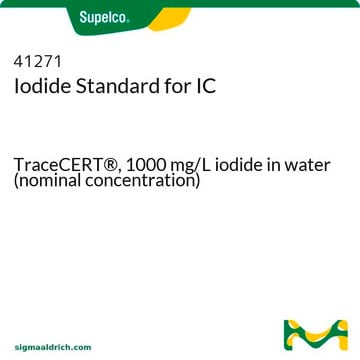03002
Iode
puriss., meets analytical specification of Ph. Eur., BP, USP, 99.8-100.5%
About This Item
Produits recommandés
Densité de vapeur
9 (vs air)
Pression de vapeur
0.31 mmHg ( 25 °C)
1 mmHg ( 38.7 °C)
Qualité
puriss.
meets analytical specification of Ph. Eur., BP, USP
Pureté
99.8-100.5%
Résistivité
1.3E15 μΩ-cm
Impuretés
residual solvents, in accordance
≤0.03% non-volatile matter
Point d'ébullition
184 °C (lit.)
Pf
113 °C (lit.)
Traces d'anions
bromide, chloride (as Cl-): ≤250 mg/kg
sulfate (SO42-): ≤50 mg/kg
Chaîne SMILES
II
InChI
1S/I2/c1-2
Clé InChI
PNDPGZBMCMUPRI-UHFFFAOYSA-N
Vous recherchez des produits similaires ? Visite Guide de comparaison des produits
Catégories apparentées
Description générale
Application
- Synthesis of oligonucleotides using a standard Applied Biosystems 392 DNA/RNA Synthesizer.
- Fabrication of electrochemical solar cells by using the single-walled carbon nanotubes (SWNTs)-modified fluorine-doped tin oxide coated glass (FTO) glass as the working electrode.
- To compose iodide-based solution, used as the liquid electrolyte in the dye-sensitized solar cells.
It may be used for the trace-labelling of proteins. It may be used for the iodination methods, in which the cationic portion of the iodine molecule bounds to the ring structure of tyrosine. Theoretical efficiency of labelling achieved is 50%.
Mention d'avertissement
Danger
Mentions de danger
Conseils de prudence
Classification des risques
Acute Tox. 4 Dermal - Acute Tox. 4 Inhalation - Acute Tox. 4 Oral - Aquatic Acute 1 - Eye Irrit. 2 - Skin Irrit. 2 - STOT RE 1 Oral - STOT SE 3
Organes cibles
Respiratory system, Thyroid
Code de la classe de stockage
6.1D - Non-combustible acute toxic Cat.3 / toxic hazardous materials or hazardous materials causing chronic effects
Classe de danger pour l'eau (WGK)
WGK 2
Point d'éclair (°F)
Not applicable
Point d'éclair (°C)
Not applicable
Certificats d'analyse (COA)
Recherchez un Certificats d'analyse (COA) en saisissant le numéro de lot du produit. Les numéros de lot figurent sur l'étiquette du produit après les mots "Lot" ou "Batch".
Déjà en possession de ce produit ?
Retrouvez la documentation relative aux produits que vous avez récemment achetés dans la Bibliothèque de documents.
Les clients ont également consulté
Notre équipe de scientifiques dispose d'une expérience dans tous les secteurs de la recherche, notamment en sciences de la vie, science des matériaux, synthèse chimique, chromatographie, analyse et dans de nombreux autres domaines..
Contacter notre Service technique









